With existing industries especially, the small and medium enterprises (SMEs) preferring product development through deployment of Industrial Internet-of-Things (IIoT) over legacy systems, it generally becomes a matter of curiosity as to whether it makes sense to continue with such redundant systems. Here, the key focus area is effective manufacturing whilst utilising legacy systems harnessing IIoT.
In this regard, Rahul R of Electronics For You interacted with Narayanaswamy who is chief executive officer (CEO) and chief technology officer (CTO) at Mysore-based METI M2M India. Narayan threw sufficient light on IIoT, legacy systems, and deployment of IoT solutions over legacy industrial systems.
Q. Talking about legacy industrial systems, how practical do you think is the deployment of IoT over such systems? How relevant are legacy industrial systems today?
A. It completely depends on the industry There are many SMEs that still work with old machines. As long as the industry doesn’t have any plans to phase out the legacy systems soon, it still makes sense.
Many a time, the legacy system will form the core of the manufacturing system, its effectiveness will directly affect the overall production. The systems might be working fine, without any data available for accountability. This is where our expertise comes in. Even getting simple production count in real time for these machines, can provide many insights to optimise the production.
Q. Since you have stated that legacy systems are viable, what could be the likely challenges during IoT deployment?
A. Legacy industrial systems are hard to handle. Some come with no electronics whatsoever and some machines are very delicate, with very few people to service them. Suppliers of those machines are long gone. Existing operators normally avoid doing anything new with these machines.
This is where we as IoT service providers come into the picture, our IoT solution is built for any machine. Our ready to deploy hardware is as simple as connecting a mobile phone to a charger.
Q. Do you have any case study highlighting the deployment of smart factory engineering solutions?
A. IoT deployment is one of the biggest challenges. Our expertise lies in non-intrusive ready to deploy systems. One of our clients is a reputed automobile parts manufacturer.
We have connected their entire line from process to production without stopping a single machine during installation. This process involved system study and working with their maintenance team to understand the process and machines. Then we built ready-to-deploy solutions with our existing hardware, pre-configured to each individual machine.
Deployment for each machine took around 30 to 45 minutes. With our solutions, client has accurate data of process, production and energy parameters. Therefore, they can derive energy, manpower and from this, exact price for every part produced. Most importantly, they have been able to eliminate downtimes induced due to inefficiencies within the floor.
Like in one of the machines, biggest downtime was non-availability of raw material. To mitigate this, they just had to connect the machine operator with the right person in the store. They have also eliminated recalls due to inferior quality from the market. Next step is to integrate their enterprise resource planning (ERP) programs with our application programming interfaces (API) and also start tracking movement of material within the manufacturing unit.
Q. With Karnataka generally known as an SME-hub, what would be your one-line recommendation to new entrants with respect to IoT implementation over legacy systems, including protocols?
A. From the Indian context, IoT doesn’t have to be about machine learning or predictive maintenance, SMEs can start with as simple as production and downtime monitoring for one machine and then scale up over a period of time.
Q. Finally, with Industry 4.0 being the latest buzzword, how do you view co-ordination between the Indian manufacturing scheme of things and new trends?
A. Research and development for Industry 4.0 has come of age. Now is the right time for Indian manufacturing sector to catch up.
To start with, they first need to start capturing basic data (like energy, production and process) from all their machines into one platform.
The next processes can focus on capturing inputs from the operators and supervisors. Data from production, process, and energy can together provide the right information about every product output of the manufacturing unit.
This is very important in the Indian context, where most of the manufacturers depend heavily on manpower. Once you have the data, possibilities are many. The next five years are going to be game changers, machine learning will be a norm, for which historical data would act as a driver; I would advise manufacturers to start at the earliest.






